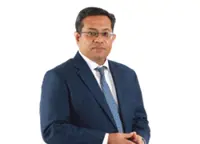France's Deputy Minister for Foreign Trade, Attractiveness, Francophony and French Nationals Abroad Franck Riester (right) tries VR goggles during the GITEX Africa Tech and Startup show in Marrakesh on May 30, 2024. — AFP
African startups, addressing overlooked needs, are putting the spotlight on a burgeoning tech scene, despite challenges like inequality and limited digitalisation.
At the GITEX Africa fair in the Moroccan city of Marrakesh last week, innovations in remittances and healthcare that cater to the continent's demands underscored the thriving sector.
One of those at the show, Jean-Charles Mendy, launched an app with his business partner three years ago, giving people working abroad better control over the money they send to their families back home.
"The market for sending money by Africans in the diaspora is huge," the 40-year-old Senegalese entrepreneur told AFP on the sidelines of the gathering that drew about 1,500 startups, companies and banks.
The app, only available to the Senegalese diaspora for now, enables direct payment of bills, including electricity or phone expenses, or conversion into vouchers for supermarket purchases.
Remittances to sub-Saharan Africa reached over US$50bil (RM235.37bil) last year, according to the World Bank.
People in the diaspora "find that they sacrifice too much for their money to be misused", said Mendy.
"If you are not Senegalese, you won't imagine that this is a problem that people encounter," he said.
"All solutions we have put in place are a combination of European solutions used to meet African needs, thanks to technology."
Fast growth
The International Finance Corporation, the World Bank's private sector arm, says Africa's startup ecosystem, particularly in mobile payments, is the world's fastest growing.
But significant inequality plagues the continent, characterised by widespread lack of digitalisation and a challenging financial environment.
The Partech Africa private equity fund says the continent's tech ecosystem was valued at US$3.5bil (RM16.47bil) last year, marking a 46% decline from 2022, with half of its active investors lost.
Bennie Mmbaga, head of investments at Maua Mazuri, a biotechnology startup aimed at boosting banana yields, said when it was established in 2020, foreign investors "failed to understand the need" for its innovative approach.
"In East Africa, bananas are used for everything," and although Tanzania has some of the largest banana plantations in the world, yields fall far behind other countries, partially owing to a virus that has been particularly rampant since 2020, he added.
Today, his startup helps 1,000 farmers with resistant seeds and makes up to $655,000 in revenues per year.
"Investors realise now that there is a need," he added.
Healthcare technology is another growing sector in Africa, where more than half of the 1.4 billion people currently live in poverty and lack medical coverage, according to the United Nations Economic Commission for Africa, or UNECA.
"Governments spend only six percent of their GDP on healthcare," said Mactar Seck, head of innovation and technology at UNECA.
"We have to do something. Half of Africa's population doesn't have health care coverage."
Healthcare
Renee Ngamau cofounded CheckUps, a company providing "tech-enabled" medication and delivery services in remote areas of Kenya and South Sudan.
Through its mobile app, patients find access to affordable medical coverage without age or medical record criteria, get small loans from a partner bank, or promptly get in touch with the nearest nurse.
The company also provides services to relatives of the main beneficiaries.
"We understand the ecosystem in which we are," said Ngamau, 53. "The African family is structured differently, so we allow our beneficiaries to share their benefits with their parents, neighbours, whoever is important to them."
In Kinshasa, doctor and entrepreneur Ulrich Kouesso launched LukaPharma, an app with a map of nearby pharmacies where medication is available in the Democratic Republic of Congo capital.
Kouesso said the app solves three problems: the waste of time looking for pharmacies in the city of 15 million people, the phenomenon of "fake pharmacies" operating without a licence, and finding coveted medication, especially anti-cancer drugs.
"People are not aware of the potential that technology can bring to solving their problems," said Kouesso.
"Knowing that the Congolese population is around 100 million, imagine the potential lives that can be saved with such an application," he added. "And also the potential in doing business." – AFP





